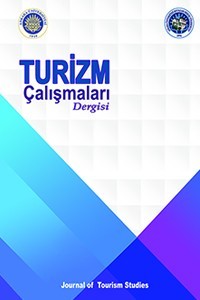Bölgelerde Turı̇zm Organı̇zasyonunun Ekonomı̇k Değerlendı̇rmesı̇nde Metodolojı̇k Yaklaşımların Analı̇zı̇
Makale, turizmin geliştirilmesinde yeni metodolojik yaklaşımların ana yönlerinden biri olan sosyo-ekonomik, yenilikçi ve ekolojik yaklaşımları analiz etmektedir. Ülkelerin gelişmişlik düzeyine bağlı olarak turizmin bölgesel politikayı şekillendirmedeki rolü tespit edilmiş ve uluslararası düzeyde istihdam ve GSYİH üzerindeki etkisi gösterilmiştir. Azerbaycan'da turizm gelişiminin genel ekonomik kalkınma ve GSYİH üzerindeki etkisinin analizi ile birlikte, turizm endüstrisinin dinamik kalkınmanın sağlanmasındaki rolü belirlenmiştir. Makale, farklı bölgesel kalkınma modellerini ve bunların ülkemizde uygulanma olanaklarını analiz etmenin yanı sıra turizmin çeşitli alanlarını da incelemektedir. Ülkedeki turizmin makro ve mikro-ekonomik göstergeleri analiz edilmiş ve bunların istihdam ve bölgelerdeki küçük ve orta ölçekli işletmelerin gelişimi üzerindeki etkileri belirlenmiştir.
Anahtar Kelimeler:
: turizm, yatırım, ekonomik kalkınma, talep, arz, sentetik yaklaşım
Analysis of Methodological Approaches in the Economic Assessment of the Organization of Tourism in the Regions
The article analyses socio-economic, innovative, and ecological approaches, which are one of the main directions of new methodological approaches in the development of tourism. The role of tourism in shaping regional policy, depending on the level of development of countries, has been identified and the impact on employment and GDP has been shown at the international level. Along with the analysis of the impact of tourism development in Azerbaijan on the overall economic development and GDP, the role of the tourism industry in ensuring dynamic development is determined. The article analyses different models of regional development and the possibilities of their application in our country, as well as analyses various areas of tourism. Macro and micro-economic indicators of tourism in the country were analysed and their impact on employment and development of small and medium enterprises in the regions was identified.
Keywords:
tourism, investment, economic development, demand, supply, synthetic approach,
___
- Bahar, O. and Kozak, M. (2006). Tourism Economics. Ankara: Detay Publishing.
- Dargahov, V.S., Talibov, S.A. and Mammadov G.V. (2021). Possibilities of assessment of cultural heritage resources in Azerbaijan and application of international experience in the register (on the example of the Lesser Caucasus natural region). BSU News Natural Sciences Series, 4, 93-101.
- Dieke, U.P. (2003). Tourism in Africa’s Economic Development: Policy Implications. Management Decision, 41(3), 287–295.
- Drucker, P. (2002, August). The discipline of innovation, Harvard Business Review. URL: https://hbr.org/2002/08/the-discipline-of-innovation
- Duarte-Duarte, J.B., Talero-Sarmiento, L.H., Rodríguez-Padilla, D.C. (2021). Methodological proposal for the identification of tourist routes in a particular region through clustering techniques. Heliyon, 7(4), 1-9.
- Grdzelishvili, N. and Kvaratskhelia L. (2020). Methodological features and problems of assessment of tourist and recreational resources of the territory. Sciences of Europe, 60, 3-5.
- Ichoz, O. and Kozak, M. (2002). Tourism Economics. Ankara: Turhan Kitabevi.
- Khan, H.M.U. (2019, June 10). Azerbaijan’s Economics of Tourism. URL: https://dnd.com.pk/azerbaijans-economics-of-tourism/166779
- Klein, Y.L., Osleeb, J.P. and Viola, M.R. (2004). Tourism-Generated Earnings in the Coastal Zone. Journal of Coastal Rsearch, 20(4), 1080-1088.
- Krutikov, V.K., Yakunina, M.V. and Hudy-Husky, D. (2017). Improving the tools of state stimulation of the region. Kaluga: IP Yakunina A.V. Publishing house.
- Liu, A. and Wall, G. (2006). Planning Tourism Employment: A Developing Country Perspective. Tourism Management, 27, 159-170.
- Lyon, A., Hunter-Jones, P. and Warnaby, G. (2017). Are we closer to sustainable development? Listening to active stakeholder presentations on tourism development in the Waterberg Biosphere Reserve, South Africa. Tourism Management, 61, 234-24.
- Martin, R. (2015). Rebalancing the spatial economy: the challenge for regional theory. Territory, Politics, Governance, 3(3), 235-272.
- Saparbayev, A., Saparova, G., Makulova A., Abdulkhalil, A. (2020). Methodology of The Research of Organizational and Economic Bases of Development of Agro, Ethno and Spiritual Tourism in the Republic of Kazakhstan. Proceedings of the E3S Web of Conferences, 159, 1-12. DOI: 10.1051/e3sconf/202015904010
- Serra, J., Font, X. and Ivanova, M. (2017). Creating shared value in the organizations managing the direction: the example of Turisme de Barcelona. Journal of Destination Marketing & Management, 6 (4), 385–395.
- Soltanova, H.B. (2015). Tourism and its development in the Republic of Azerbaijan. Baku: AzTU Publishing House.
- Strategic Road Map of the Republic of Azerbaijan on the development of the specialized tourism industry. Legislation of the Republic of Azerbaijan. Baku: Eurasia press, 2016.
- Tosun, C., Timothy, D. J. and Ozturk Y. (2003). Tourism Growth, National Development and Regional Inequality in Turkey. Journal of Sustainable Tourism, 11(2), 133-161.
- Temple, J. (2000). Growth Effect of Education on Social Capital in the OECD Countries. OECD Working Paper, 1-36.
- Tourism in Azerbaijan. (2023, September 5). Statistical yearbook. The State Statistical Committee of the Republic of Azerbaijan. URL: https://www.stat.gov.az/source/tourism/
- Ziyadin, S. and Takhtaeva, R. (2014). Trends and problems in tourism development on the territory of Eastern Kazakhstan region. Actual Problems of Economics, 9, 232-236.
- Başlangıç: 2019
- Yayıncı: Ankara Üniversitesi
Sayıdaki Diğer Makaleler
Turizm Sektöründe Artırılmış Gerçeklik ve Dijital Dönüşümün Değerlendirilmesi
Shahin AZADALİYEV, Sehnaz DEMİRKOL
Gastronomi Turizmi Kapsamında Taşköprü Sarımsağı’nın Değerlendirilmesi
Turizm Endüstrisinde Kriz Olgusu ve Yakın Tarihte Meydana Gelen Salgın Hastalıkları ve Etkileri
